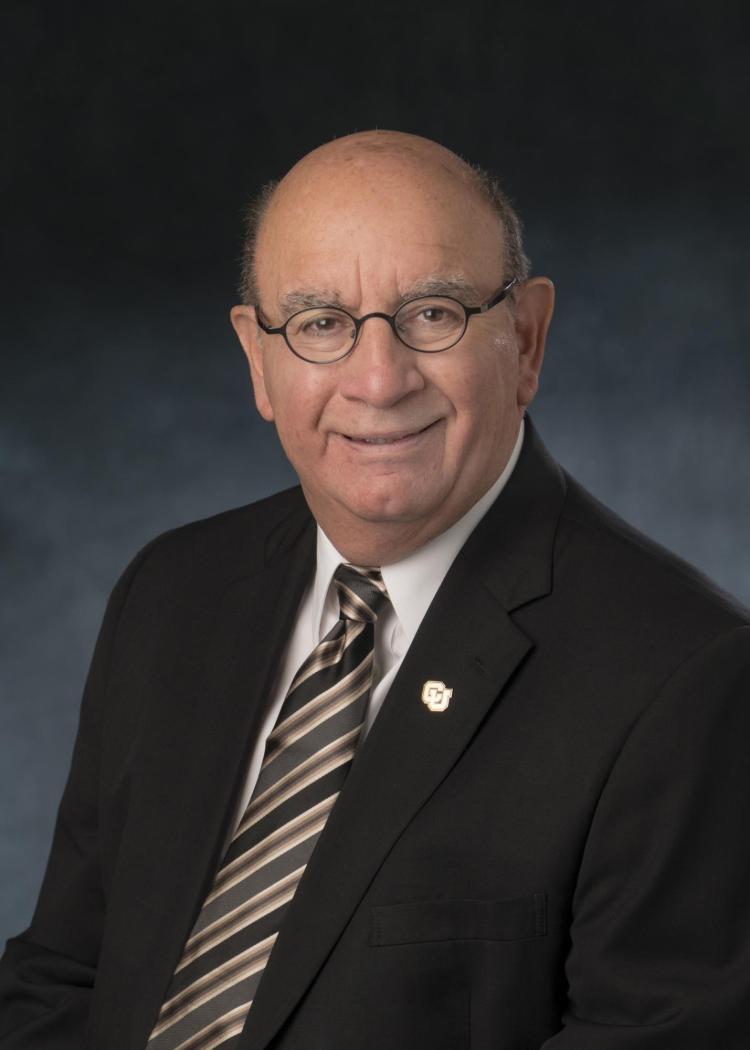NCAA boards, DiStefano endorse reforms to college basketball
Today the NCAA Board of Governors and Division I Board of Directors, unanimously endorsed a series of recommendations from the Commission on College Basketball, chaired by former Secretary of State Condoleezza Rice. CU Boulder Chancellor Philip DiStefano sits on both NCAA boards.

Chancellor Philip P. DiStefano
The commission recommendations will “ensure integrity in the game, strengthen accountability in college sports and demonstrate a commitment to the well-being of student-athletes,” the NCAA statement said.
Division I basketball was plagued last season by well-publicized allegations of bribery and corruption that led to federal prosecutors’ charges against some assistant coaches and an apparel company executive.
Federal prosecutors allege that an Adidas executive and others with ties to the company bribed players' families and college coaches to entice top prospects to commit to schools that Adidias sponsored. Those players later signed contracts to endorse the company’s products.
The commission, in its recommendations, called for:
- The end of the “one-and-done” practice in which top players only play their freshman season before moving onto the NBA.
- The establishment of a new system for summer basketball—essential to the recruitment process—that would keep out apparel companies.
- Coaching and administrator contracts that require cooperation with NCAA investigations.
- That coaches, athletic directors and college presidents certify annually that their athletic programs comply with NCAA rules.
- The establishment an independent investigative body for major issues.
DiStefano endorsed the recommendations.
Division I council members will forward final changes to the Division I Board and the Board of Governors for approval in August, the NCAA said in the statement.
DiStefano said that one key to successful reform is the NCAA working closely with other organizations outside the NCAA – including USA Basketball, apparel companies, the National Basketball Association and its players’ association to make meaningful and lasting changes that will support the commission’s recommendations.
“If we don’t have a strong collaboration then we won’t achieve recommendations by the commission,” DiStefano said.
Summary of recommendations from the Commission on College Basketball
- End One-and-Done. Separate the collegiate track from professional by ending one-and-done.
- Greater Draft Flexibility for Student-Athletes. Allow student-athletes to test their pro prospects and maintain their college eligibility if they do not sign a professional contract.
- NCAA-Certified Agents to Provide Student-Athletes with Assessment of Professional Prospects. Permit students to receive meaningful assessment of their professional prospects earlier, with assistance from NCAA-certified agents. NCAA appoints a VP to, among other things, develop meaningful standards for certification of agents.
- Provide Resources to Make the Promise of a College Education Real. NCAA to establish fund to pay for the degree completion of student-athletes with athletic scholarships who leave member institutions after progress of at least two years towards a degree.
- Independent Investigation and Adjudication of Complex Cases. NCAA to establish independent investigative and adjudicative body.
- Enact and Impose Core Punishments with Significant Deterrent Effect. Core penalties should be increased to allow 1) Five-year postseason ban for Level I violations; 2) loss of all revenue sharing in post-season play for the entire ban; 3) lifetime bans for a show-cause order; 4) allow bans of more than one season for head coach violations; 5) increase penalties to allow full-year visit bans for recruiting visit violations.
- NCAA to amend rules to require colleges to include in contracts with administrators and coaches’ contractual obligations to cooperate with NCAA investigations and agree to submission to NCAA enforcement proceedings.
- Require coaches, athletic directors and college presidents to certify annually that their athletic programs comply with NCAA rules.
- Reform Non-Scholastic Basketball and Make its Finances Transparent. NCAA should enforce rigorous certification criteria for non-scholastic basketball events that coaches attend. Events should be subject to financial disclosure, an audit of all financial relationships and payments, IRS, and other tax filings. Events must also have educational components.
- Enlist Apparel Companies in Transparency and Accountability Efforts. Boards of public apparel companies should implement financial transparency and accountability with respect to their investments in non-scholastic basketball.
- In Cooperation with Partners, Establish NCAA Youth Basketball Programs. With a goal of 2019, we recommend that the NCAA work with USA Basketball, the NBA and the NBPA and others to establish and administer new youth basketball programs.
- Enact Changes in Rules Governing Recruiting and Coaches’ Interaction with Recruits and Student-Athletes. Reduce the influence of third parties and increase the ability of college coaches to interact with recruits and current players. We endorse adoption of a number of rule changes recommended by the National Association of Basketball Coaches.
- Add Five Independent Public Members to The NCAA’s Board of Governors.


